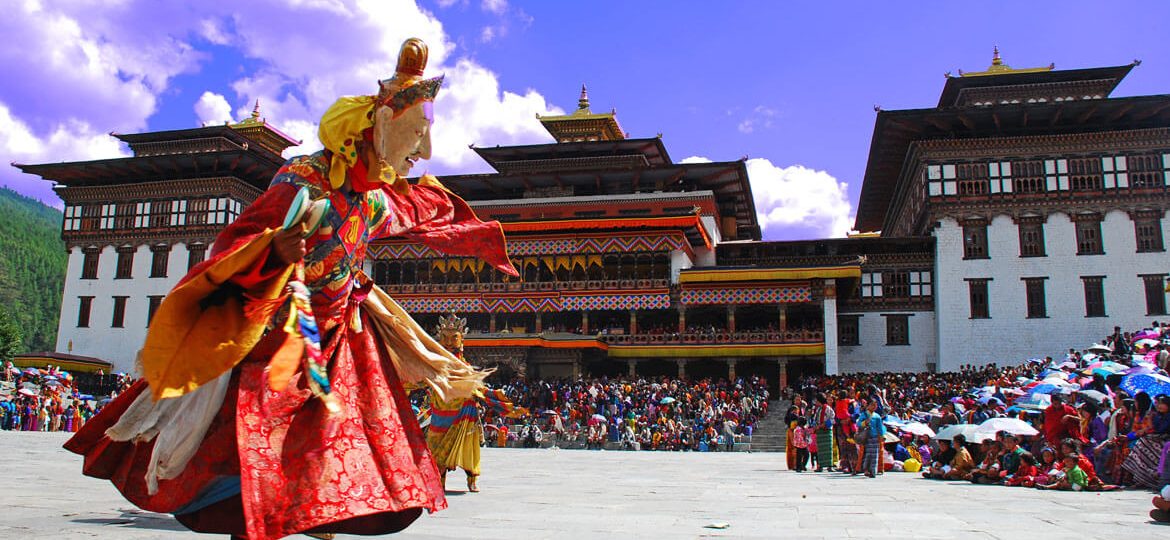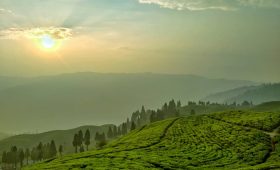We have listed the Festival Calendar of Bhutan which is celebrated in the national. The Bhutanese love of pageantry, pomp, and ceremony is evident in their many unique, colorful, and often spectacular festivals.
January, February, March
Chunipa Losar
The “Traditional Day of Offering” is celebrated on the first day of the twelfth month of the Bhutanese calendar, and is devoted to making offerings of thanksgiving and ritual feasting. Historically it was on this day that people gathered from all over the country to make offerings to the Zhabdrung at the Punakha Dzong as an expression of their love, devotion, and loyalty.
Dangpai Losar
This is the New Year in Bhutan—as it is also in Tibet— and is observed throughout the country, either with early-morning prayers in the family shrine room or with a visit to the monastery to pray and make offerings for a prosperous year. People usually refrain from doing anything negative on this day, to ensure a smooth and uneventful year ahead.
February 21: The King’s Birthday
This is a three-day holiday, beginning on February 21. Various cultural events are held in schools and districts.
May, June, July
Zhabdrung Kuchoe
On the tenth day of the third Bhutanese month, the country marks the anniversary of the death of Zhabdrung Ngawang Namgyal, the Unifier of Bhutan. On this day in 1651, he is believed to have “entered into a retreat” and remained in this state for many years. The day is now observed as the anniversary of his death. Offices and schools are closed for the day, and people visit monasteries to offer prayers and butter lamps to mark the anniversary.
Lord Buddha’s Parinirvana, or Duechen Nga Zom
This is observed on the fifteenth day of the fourth month of the Bhutanese calendar. It was on this day that Buddha was conceived, was born, subdued evil gained enlightenment, and left this life, attaining nirvana. It is considered to be one of the most auspicious days not only for the Bhutanese but for Buddhists all over the world. Special prayers are held in all the important monasteries, and in Thimphu devotees throng the Trashichho Dzong to receive blessings from the huge thongdrol that is unfurled.
The Birth Anniversary of Guru Padmasambhava
Another important public holiday is the Birth Anniversary of Guru Padmasambhava, or Guru Rinpoche, as he is popularly known in Bhutan. It is celebrated on the tenth day of the fifth month of the Bhutanese calendar, which typically falls in June or July in the Gregorian calendar. Prayers are conducted in monasteries throughout the country, and the Bhutanese devote the day to prayer and gaining merit.
Drukpa Tshe Zhi, the First Sermon of Lord Buddha
This is observed every fourth day of the sixth month in the Bhutanese calendar, and it is considered the most significant and auspicious day in the Buddhist calendar. It was on this day that Buddha Shakyamuni gave his first sermon in the Deer Park at Sarnath, in India, after attaining enlightenment. He taught the Middle Way: refraining from extremes of pleasure; the practice of austerity; the following of the Four Noble Truths, and the Eightfold Paths, which became known as the First Turning of the Wheel of Dharma.
September, October
Thrue Bab
This day, the “Blessed Rainy Day,” marks the end of the monsoon season in Bhutan. During the auspicious hour, all waters on Earth are believed to be sanctified, and people are encouraged to take an outdoor bath to be cleansed of “bad deeds, defilement, and accumulated bad karma.” The most favorable hour for the ablution ceremony is determined by astrologers from the Zhung Dratsang, the central monastic body.
Dasain
Dasain is an important festival for Hindus celebrating the victory of the goddess Durga over the demon Mahishasura. The festivities last for several days, with significant events taking place every day until the tenth day when families get together to celebrate and enjoy enormous meals. Parents put tikka (made of rice, yogurt, and vermilion) on the children’s foreheads for a happy and prosperous life.
November/December
Lhabab Duechen
This falls on the twenty-second day of the ninth Bhutanese month. It marks the day on which Buddha returned to Earth from the realm of the gods, after giving teachings to his mother, who was reborn there. Special prayers are held in monasteries and people offer their prayers at home, visit monasteries, offer butter lamps, and give alms to the poor or needy. It is believed that all positive or negative actions on this day are multiplied ten million times.
Ngenpa Guzom
This day, the “Meeting of Nine Evils,” has recently been removed from the national holiday list, but nonetheless it is one of the popular festive events still observed. The day falls on the seventh day of the eleventh Bhutanese month. People refrain from doing any important work, in the belief that nothing good can be achieved on this day. In eastern Bhutan, the day is a festive occasion on which to eat, drink, and make merry.
Nyilo
This translates as “A Good Year,” and coincides with the winter solstice. It is mainly celebrated as New Year in the western region of Bhutan. Groups of young children visit homes and sing lolly (songs like carols). They are usually grouped in odd numbers because even numbers are considered to bring bad luck.


